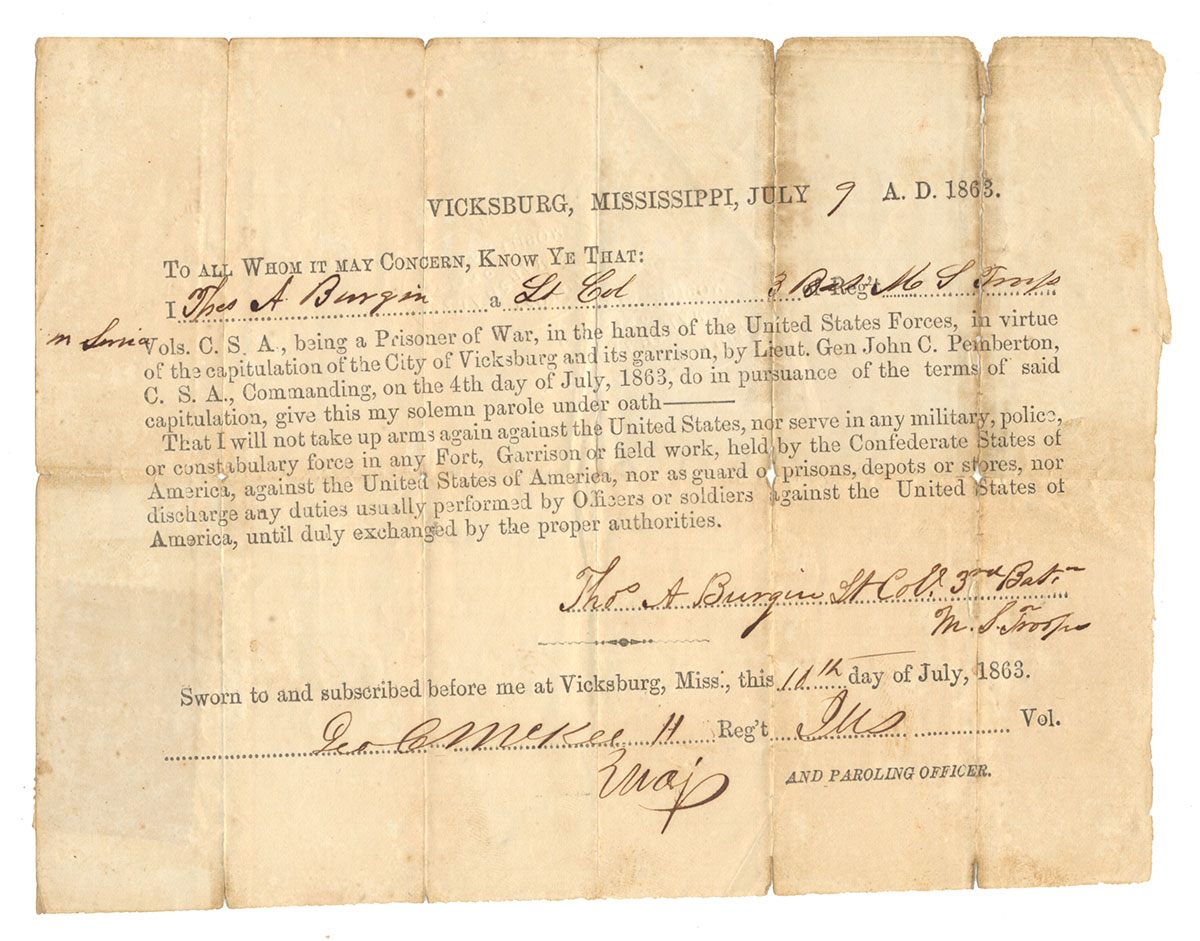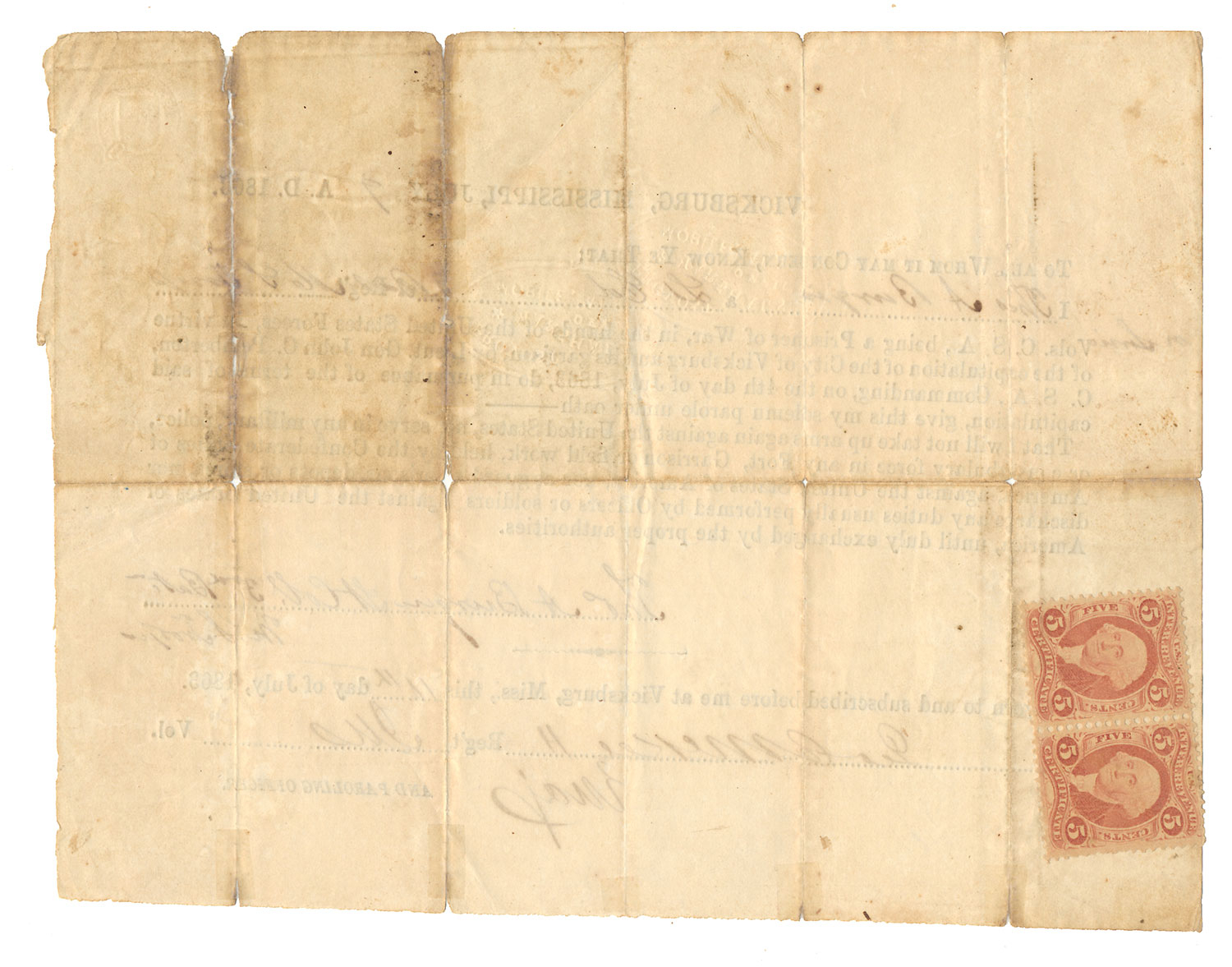site search
online catalog
SCARCE VICKSBURG PAROLE: LT. COL. T. A. BURGIN, COMMANDER OF THE 3rd MISSISSIPPI BATTALION, STATE TROOPS

Hover to zoom


$1,900.00
Quantity Available: 1
Item Code: 1300-59
Shipping: Determined by Method & Location of buyer
To Order:
Call 717-334-0347,
Fax 717-334-5016, or E-mail
This Vicksburg parole was given to Lt. Colonel Thomas Albertus Burgin, commander of one of the two units of Mississippi State Troops serving with Pemberton and captured at Vicksburg. They were among the units of “Minute Men” called up under an 1862 call up of troops for defense of the state, never mustered into Confederate service, but placed under Confederate command. It reads as follows, with the hand-written portions in boldface:
VICKSBURG, MISSISSIPPI, JULY 9 A.D. 1863
TO ALL WHOM IT MAY CONCERN, KNOW YE THAT:
I Thos A Burgin a Lt Col of 3 Bat [“regt is crossed out] M S Troops in Service Vols. C. S. A., being a Prisoner of War, in the hands of the United States Forces, in virtue of the capitulation of the City of Vicksburg and its garrison, by Lieut. Gen. John C. Pemberton, C. S. A., Commanding, on the 4th day of July, 1863, do in pursuance of the terms of said capitulation, give this my solemn parole under oath —
That I will not take up arms again against the United States, nor serve in any military police or constabulary force in any Fort, Garrison or field work, held by the Confederate States of America, against the United States of America, nor as guard of prisons, depots or stores, nor discharge any duties usually performed by Officers or soldiers, against the United States of America, until duly exchanged by the proper authorities.
Thos A Burgin Lt Col 3rd Batn.
M S Troops
Sworn to and subscribed before me at Vicksburg, Miss., this 10th [11th?] day of July, 1863. Geo. C. McKee 11 Reg’t Ills Vol Maj AND PAROLING OFFICER
This measures 6-1/2 inches by 8 inches (with the right edge uneven,) and is in good condition, fully legible with the brown ink additions still dark. It has one horizontal fold and five vertical creases, with some foxing and some very minor separations along some folds, more noticeable from the back than the front, and only affecting the “o” in “of” in line 3 paragraph 2 of the text, and showing some archival reinforcements on the reverse at the tops of some creases.
There is a faint watermark in the paper at upper left we cannot fully make it out, but it is a vertical oval with a shield in the center and the border in the form of a heraldic belt like that used by the Civil War US Provost Marshal. This could be a coincidence, but likely reflects that department was in charge of the parole process and printing of the paroles. Two impressed oval stamps near the center of the page are much clearer and read, “PROVOST / MARSHAL’S / OFFICE / MOBILE ALA.” These would correspond with the two US 5-cent revenue stamps at bottom right of the reverse, indicating Burgin had registered his parole with that office sometime after the fall of Mobile to U.S. forces in April 1865. A fund-raising effort for the war these stamps came into use in August 1862. Civil War collectors with be most familiar with those used on photographs from 1864 to 1866. Documentary stamps like this continued for a longer period. We do not see a cancellation or date stamp on them.
Burgin had been born in Cherokee, GA, in 1814, married in 1837, moved to Alabama about 1839 and by the 1850 census was in Dallas County, Alabama with his wife and five children. He listed himself as a farmer with some $5,000 worth of real estate. By 1860 the family were in Tuscaloosa, where he listed himself as a farmer and clerk, apparently doing bookkeeping for a local businessman, but with substantial real estate and a personal estate worth some $30,000, which likely included the monetary value of 21 slaves listed on the 1860 “slave schedule” under his name. (A later reminiscence by a daughter places the number as high as 50 at points.)
At some point between 1860 and 1862 he seems to have bought farmland that overlapped the Lowndes and Oktibbeha County boundaries, and selected the town of Mayhew, Lowndes County, as his official residence, and by 1862 was 1st Lieutenant of Company E of the 14th regiment, apparently referring to one of the state’s 108 or so regiments of “enrolled militia,” all able-bodied, adult, white males. In 1862, however, he joined in the call up of state troops by the Governor and state legislature for state defense. These were nicknamed “Minute Men,” were to be drawn from the militia to serve six months, and were organized into 5 regiments and 4 battalions of infantry and 1 battalion of cavalry.
Burgin had been Captain of a local militia company and in 1862 became the Lieutenant Colonel commanding the 3rd Battalion of infantry of the state troops, nicknamed as a whole the “Minute Men,” called up by the Governor and state legislature for state defense for six months service with companies formed of men drawn from the militia and organized into 5 regiments and 4 battalions of infantry, along with a battalion of cavalry. With a large part of the younger male population of military age serving in the volunteer forces in Confederate service, members of these units tended to be older, with members of Burgin’s 3rd Battalion averaging age 37. Most of these units remained in military camps within the state, unhappy at the distance from their homes, but not seeing action. The 3rd Battalion, formed with men from Lowndes and surrounding counties was one of the few exceptions. Though not mustered into Confederate service, it was placed under Confederate command and saw action.
Organized in early August 1862, they were sent to camp at Okolona in September, where the field officers were formally elected September 25, and then sent to Vicksburg in November, where they took part in the Battle of Chickasaw Bayou, the opening battle of the Vicksburg Campaign, suffering no casualties, but enduring artillery bombardment on the right of the Confederate line at Snyder’s Bluff. In April they took part in defending railroad lines and bridges against attacks by elements of Grierson’s cavalry, and on May 5 were again ordered to Vicksburg, reaching there May 9, serving alongside the 5th Regiment of State Troops in brigade commanded by Gen. J. V. Harris. They first served along the river at Warrenton about 5 miles south of Vicksburg, but on May 18 moved to a position north of the city and went into the trenches on May 19, where they remained throughout the siege. Although serving with the 5th Regiment under Harris they were also at points designated as part of Baldwin’s and Vaughan’s brigades.
A monument and markers devoted the 3rd Battalion at Vicksburg indicate they manned a trench line running east from Fort Hill, which was a strong point anchoring the northern flank of the Vicksburg defenses. Harris reported 15 killed, 19 wounded and 34 died of disease in the brigade during the siege. An Aug. 5, 1863, roll made out by Burgin gives specific information on Burgin’s battalion, indicating that during the siege it fielded six companies with an aggregate strength of 291, with fewer available for duty at any one time. Of these, 1 man deserted in June, 7 were killed during the siege, 3 were wounded, and 11 died of disease. Of the 269 remaining and paroled, 20 were sick at the time of the surrender (and apparently left in hospital at Vicksburg) giving a total of 249 on parole.
After the surrender on July 4, and paroling of the prisoners, Harris’s two Mississippi units left Vicksburg on July 15. They lost some men to straggling and desertion on the march, but no more than others according to Harris, and reached Brandon on July 17, where the brigade was detached from Confederate service and ordered to report to the Governor. With Jackson in federal hands and Federal forces in close proximity, however, Harris deemed it best to send the men home to await orders. He was subsequently ordered, on August 26, to have the state troops captured at Vicksburg assembled at Columbus, paid up the time of their parole, and then mustered out.
A second levy of state troops took place in 1864, but Burgin did not return to that service, though he may still have had some role in local militia. The 1880 census picks him up in Mayhew, Lowndes County, listing him as a farmer and living with his wife and one son, who seems to have followed in his father’s business pursuits, listing himself as a bookkeeper. He died in Mayhew in July 1897. His wife survived him by more than a decade, passing away in 1911. Both were interred at Mayhew.
This is an interesting parole, not only deriving from a key Union victory in the war, but shedding some light on the internal politics and stresses on the state, and the Confederacy, during the war. [sr][ph:L]
~~~~~~~~~~~~~~~~~~~~~~~~~~~~~~~~~~~
THIS ITEM, AS WITH ALL OTHER ITEMS AVAILABLE ON OUR WEB SITE,
MAY BE PURCHASED THROUGH OUR LAYAWAY PROGRAM.
CLICK HERE FOR OUR POLICIES AND TERMS.
THANK YOU!
Inquire About SCARCE VICKSBURG PAROLE: LT. COL. T. A. BURGIN, COMMANDER OF THE 3rd MISSISSIPPI BATTALION, STATE TROOPS
Most Popular
Historical Firearms Stolen From The National Civil War Museum In Harrisburg, Pa »
Theft From Gravesite Of Gen. John Reynolds »
Selection Of Unframed Prints By Don Troiani »
Fine Condition Brass Infantry Bugle Insignia »
featured item
FIRST ARMY CONTRACT SPENCER RIFLE: MICHIGAN CAVALRY BRIGADE AT GETTYSBURG
The story of Spencer rifle contracts, deliveries, and government payments for purchases is complicated. Laid out by Roy Marcot in his book on Spencer’s and in a 1997 article in “Man at Arms” by Wiley Sword, who has established the serial number… (490-7231). Learn More »


